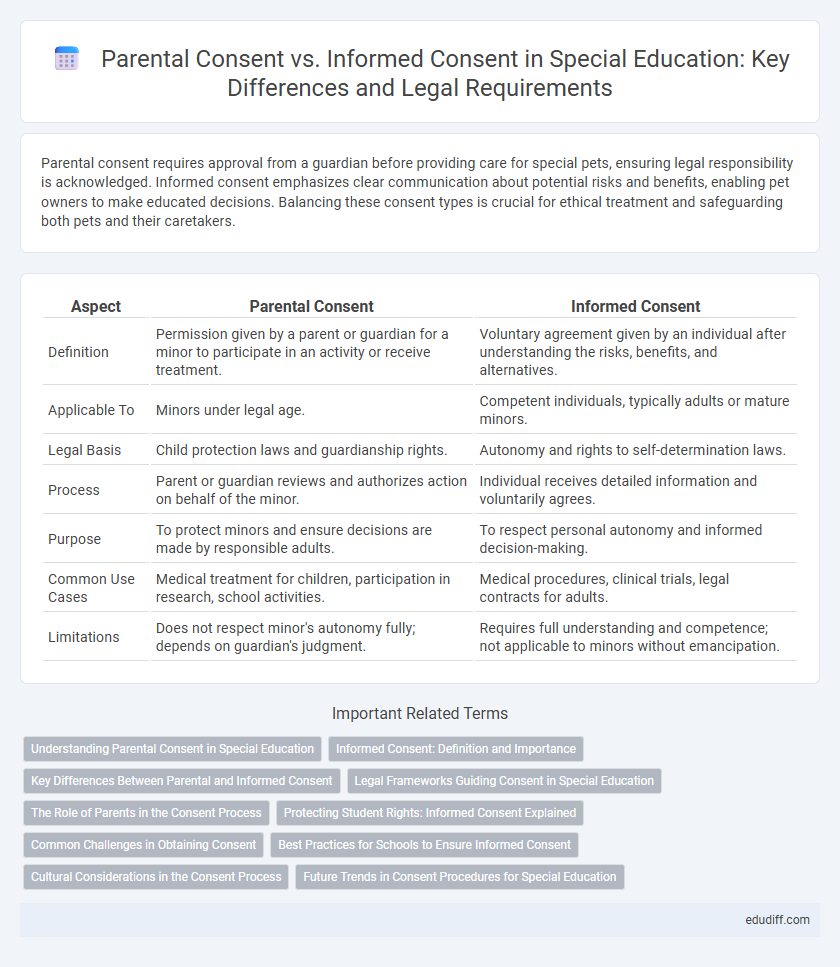Parental consent requires approval from a guardian before providing care for special pets, ensuring legal responsibility is acknowledged. Informed consent emphasizes clear communication about potential risks and benefits, enabling pet owners to make educated decisions. Balancing these consent types is crucial for ethical treatment and safeguarding both pets and their caretakers.
Table of Comparison
| Aspect | Parental Consent | Informed Consent |
|---|---|---|
| Definition | Permission given by a parent or guardian for a minor to participate in an activity or receive treatment. | Voluntary agreement given by an individual after understanding the risks, benefits, and alternatives. |
| Applicable To | Minors under legal age. | Competent individuals, typically adults or mature minors. |
| Legal Basis | Child protection laws and guardianship rights. | Autonomy and rights to self-determination laws. |
| Process | Parent or guardian reviews and authorizes action on behalf of the minor. | Individual receives detailed information and voluntarily agrees. |
| Purpose | To protect minors and ensure decisions are made by responsible adults. | To respect personal autonomy and informed decision-making. |
| Common Use Cases | Medical treatment for children, participation in research, school activities. | Medical procedures, clinical trials, legal contracts for adults. |
| Limitations | Does not respect minor's autonomy fully; depends on guardian's judgment. | Requires full understanding and competence; not applicable to minors without emancipation. |
Understanding Parental Consent in Special Education
Parental consent in special education is a legal requirement ensuring that parents or guardians are fully informed and agree to evaluations, services, or changes in their child's educational plan. It emphasizes parents' rights to receive clear, understandable information about assessments and interventions before any action is taken. Understanding parental consent is crucial for fostering collaboration between educators and families to support the student's educational needs effectively.
Informed Consent: Definition and Importance
Informed consent is a fundamental process in healthcare and legal decisions, requiring that individuals receive comprehensive information about the risks, benefits, and alternatives of a procedure or treatment before agreeing. This practice ensures respect for patient autonomy and supports ethical decision-making by enabling individuals to make knowledgeable choices regarding their care. Informed consent is essential for protecting patient rights and fostering trust between patients and providers.
Key Differences Between Parental and Informed Consent
Parental consent requires legal authorization from a parent or guardian for minors, ensuring decisions align with family rights and responsibilities. Informed consent involves providing detailed information about a procedure or treatment to ensure the individual comprehensively understands potential risks and benefits before agreeing. The key difference lies in consent source: parental consent depends on guardians, while informed consent centers on the individual's autonomous decision-making capacity.
Legal Frameworks Guiding Consent in Special Education
Legal frameworks guiding consent in special education distinguish parental consent as a prerequisite for initiating and amending individualized education programs (IEPs) under the Individuals with Disabilities Education Act (IDEA). Informed consent requires clear communication of assessment procedures, ensuring parents understand their rights and the educational implications before agreeing to evaluations or services. Courts consistently uphold that parental consent must be voluntary, informed, and based on comprehensive disclosure within the regulatory standards of federal and state laws.
The Role of Parents in the Consent Process
Parental consent plays a crucial role in legal and medical decisions involving minors, ensuring that parents or guardians authorize procedures while protecting the child's welfare. Informed consent emphasizes the minor's comprehension and voluntary agreement, promoting autonomy alongside parental involvement. Balancing parental authority with a minor's rights fosters ethical decision-making and legal compliance in sensitive consent processes.
Protecting Student Rights: Informed Consent Explained
Informed consent ensures students understand the risks and benefits of educational or medical decisions, empowering them to make autonomous choices that respect their privacy and dignity. Parental consent typically involves guardians making decisions on behalf of minors, which may limit direct student involvement in sensitive matters. Protecting student rights requires balancing parental authority with the student's right to privacy, informed decision-making, and access to confidential services.
Common Challenges in Obtaining Consent
Parental consent and informed consent often present overlapping challenges, such as ensuring clear communication and understanding of medical information. Conflicts arise when parents' decisions may not align with the minor's best interests or expressed wishes, complicating ethical and legal responsibilities. Navigating privacy laws, cultural differences, and varying maturity levels further complicates the process of obtaining valid and voluntary consent.
Best Practices for Schools to Ensure Informed Consent
Schools should prioritize transparent communication by providing clear, age-appropriate information to students and parents, ensuring comprehension of all procedures and potential risks involved. Implementing standardized consent forms tailored to legal requirements and cultural sensitivity enhances the validity of consent obtained. Regular training for staff on ethical guidelines and updated consent policies ensures adherence to best practices in informed consent within educational settings.
Cultural Considerations in the Consent Process
Cultural considerations play a crucial role in distinguishing parental consent from informed consent, as diverse cultural values influence family decision-making dynamics and perceptions of autonomy. In many collectivist societies, parental consent is prioritized to honor familial hierarchy and community consensus, while Western contexts emphasize individual informed consent grounded in personal autonomy. Healthcare providers must navigate these cultural nuances to ensure ethical consent processes that respect both cultural traditions and legal standards.
Future Trends in Consent Procedures for Special Education
Emerging trends in consent procedures for special education emphasize enhanced digital platforms to streamline parental consent and ensure informed decision-making through accessible multimedia resources. Legislative shifts advocate for integrating real-time consent tracking and individualized communication strategies tailored to each student's unique needs. Advances in artificial intelligence and data analytics are projected to facilitate personalized consent processes, promoting transparency and empowering families in special education planning.
Parental Consent vs Informed Consent Infographic

 edudiff.com
edudiff.com